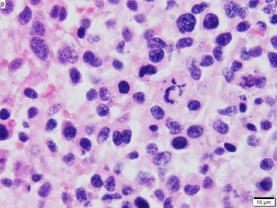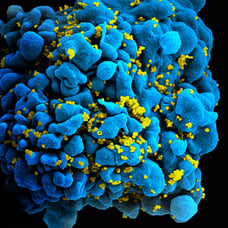 Researchers from science institutions around the world study different forms of cancer, to gain better understandings of the diseases to assist with the development of new treatment methods. One of these cancers that is continuously being studied is ovarian cancer, which effects 1 in 75 women, according to the American Cancer Society. The University of Pittsburgh plans to further enhance ovarian cancer research opportunities with the establishment of a new research center dedicated to ovarian cancer and biology research. (Image courtesy of Wikimedia Commons)
Researchers from science institutions around the world study different forms of cancer, to gain better understandings of the diseases to assist with the development of new treatment methods. One of these cancers that is continuously being studied is ovarian cancer, which effects 1 in 75 women, according to the American Cancer Society. The University of Pittsburgh plans to further enhance ovarian cancer research opportunities with the establishment of a new research center dedicated to ovarian cancer and biology research. (Image courtesy of Wikimedia Commons)
Recent Posts
Tags: University of Pittsburgh, UPITT, BioResearch Product Faire Event, New research center, ovarian cancer, 2018, Comprehensive Ovarian Biology Research Institute
 Washington University in St. Louis has 1 of 57 Institutes of Clinical and Translation Sciences (ICTS) in the United States. The ICTS at Washington University focuses on translating discoveries from both translation and clinical research into new treatments and therapies. The ICTS does not focus on just one area of life science research. Instead, researchers from all spectrums on the health sciences are able to use the institutes resources to further their work on topics like disease prevention and treatment. Training programs are also offered through the institute for researchers. (Image courtesy of P. David via Wikimedia Commons)
Washington University in St. Louis has 1 of 57 Institutes of Clinical and Translation Sciences (ICTS) in the United States. The ICTS at Washington University focuses on translating discoveries from both translation and clinical research into new treatments and therapies. The ICTS does not focus on just one area of life science research. Instead, researchers from all spectrums on the health sciences are able to use the institutes resources to further their work on topics like disease prevention and treatment. Training programs are also offered through the institute for researchers. (Image courtesy of P. David via Wikimedia Commons)
Tags: Washington University St. Louis, WashU, BioResearch Product Faire Event, MO, NIH funding, Clinical and Translational Research, 2018, clinical and translational research funding
 Researchers within the Laboratory for Research on the Structure of Matter (LRSM) at the University of Pennsylvania have been conducting breakthroughs in the field of materials science since it opened in 1961. A leading center within the LRSM that helps with this breakthrough research, the NSF Materials Research Science and Engineering Center (MRSEC), was recently awarded a $22.6 million grant from the National Science Foundation (NSF) that will support materials research at UPenn over the next six years. (Image courtesy of WestCoastivieS via Wikimedia Commons)
Researchers within the Laboratory for Research on the Structure of Matter (LRSM) at the University of Pennsylvania have been conducting breakthroughs in the field of materials science since it opened in 1961. A leading center within the LRSM that helps with this breakthrough research, the NSF Materials Research Science and Engineering Center (MRSEC), was recently awarded a $22.6 million grant from the National Science Foundation (NSF) that will support materials research at UPenn over the next six years. (Image courtesy of WestCoastivieS via Wikimedia Commons)
Tags: University of Pennsylvania, UPenn, BioResearch Product Faire Event, PA, NIH funding, NIH award, NSF funding, Materials Research, 2018, Materials Science
 In the state of California, more than 176,000 residents arediagnosed with cancer each year and more than $14 billion is spent to fight this disease in California alone. The University of California system has five of the top cancer centers in the country within theseacademic institutions. In September these five UC cancer centers announced that they were teaming up to form a cancer consortium to provide researchers and physicians in California more opportunities to further their work on cancer-related topics. (Image courtesy of Wikimedia Commons)
In the state of California, more than 176,000 residents arediagnosed with cancer each year and more than $14 billion is spent to fight this disease in California alone. The University of California system has five of the top cancer centers in the country within theseacademic institutions. In September these five UC cancer centers announced that they were teaming up to form a cancer consortium to provide researchers and physicians in California more opportunities to further their work on cancer-related topics. (Image courtesy of Wikimedia Commons)
Tags: cancer research, University of California, LAVS, SDVS, UCDMC, SFVS, BioResearch Product Faire Event, UCI, Biotechnology Vendor Showcase Event, 2018

Vaccine research is a field that is constantly growing and changing, from new vaccines being created to different vaccination methods being developed. With diseases changing and new diseases emerging, researchers around the world work tirelessly to create treatments. Researchers from the College of Veterinary Medicine at the University of Georgia, Athens recently received a grant of $3.2 million from the National Institutes of Health (NIH) to continue their work developing new vaccine platforms. (Image courtesy of John Keith via Wikimedia Commons)
Read MoreTags: University of Georgia Athens, vaccine research, UGA, BioResearch Product Faire Event, NIH funding, NIH grant, 2018, SAAVE
.jpg?width=293&name=1024px-Cytomegalovirus_infection_(3785988653).jpg) Organ transplants are common surgeries that happen around the world. In the United States, more than 33,000 transplants occurred in 2016, with more than half of these being kidney transplants. Although the majority of people come out of transplant surgery with no problems, many develop serious infections caused by the common virus cytomegalovirus (CMV)when the immune system rejects the new kidney.
Organ transplants are common surgeries that happen around the world. In the United States, more than 33,000 transplants occurred in 2016, with more than half of these being kidney transplants. Although the majority of people come out of transplant surgery with no problems, many develop serious infections caused by the common virus cytomegalovirus (CMV)when the immune system rejects the new kidney.
Tags: CA, new research funding, LAVS, UCLA, Biotechnology Vendor Showcase, NIH funding, 2017, cytomegalovirus
 Lymphoma is one of the most common types of cancer, with Non-Hodgkin Lymphoma making up about 4% of all cancer cases in the United States, according to the American Cancer Society. Although treatment methods like chemotherapy and radiation therapy are able to treat the cancer, researchers still actively study this cancer to gain a better understanding of it to develop new targeted treatment methods.
Lymphoma is one of the most common types of cancer, with Non-Hodgkin Lymphoma making up about 4% of all cancer cases in the United States, according to the American Cancer Society. Although treatment methods like chemotherapy and radiation therapy are able to treat the cancer, researchers still actively study this cancer to gain a better understanding of it to develop new targeted treatment methods.
Researchers from the Center for Cell and Gene Therapy at Baylor College of Medicine, Texas Children's Hospital and Houston Methodist Hospital have been studying new therapies for the cancer using T-cells, research that they will continue with the assistance of a new $11.5 million grant from the National Cancer Institute. (Image courtesy of TexasPathologistMSW ia Wikimedia Commons)
Read MoreTags: new research funding, cancer research, Texas Medical Center, tmc, Houston, TX, NIH funding, 2018, Lymphoma, Baylor College of Medicine
 According to the World Health Organization, more than 36.7 million people around the world are infected with Human Immunodeficiency Virus (HIV). Although there is not yet a cure for HIV, some treatments are able to slow the spread of the virus. Researchers around the world study the virus with the hope of one day creating a cure to attack the virus. A team of researchers from the University of Southern California in Los Angeles are taking a different approach to fighting HIV - by creating a treatment that boosts the immune system instead of attacking the virus.
According to the World Health Organization, more than 36.7 million people around the world are infected with Human Immunodeficiency Virus (HIV). Although there is not yet a cure for HIV, some treatments are able to slow the spread of the virus. Researchers around the world study the virus with the hope of one day creating a cure to attack the virus. A team of researchers from the University of Southern California in Los Angeles are taking a different approach to fighting HIV - by creating a treatment that boosts the immune system instead of attacking the virus.
Tags: CA, University of Southern California, USC, Los Angeles, BioResearch Product Faire Event, HIV research, 2018, HIV treatment

For cancer patients with tumors, there always a risk of the tumor spreading to a different organ, which makes fighting the cancer more difficult and risky. However, this spread of cancer very rarely occurs on skeletal muscles, which make up nearly 50% of body mass. Why don't these metastatic cancer cells move to and grow on these skeletal muscles? Researchers are still unclear. Now, with the help of a recent $1 million grant from the W.M. Keck Foundation, a research team at Fred Hutchinson Cancer Research Center will focus on studying this elusive topic. (Image courtesy of CC BY-SA 3.0 via Wikimedia Commons)
Read MoreTags: Fred Hutchinson Cancer Research Center, WA, cancer research, BioResearch Product Faire Event, Seattle, Hutch, 2017, skeletal muscle research
 Valley Fever affects nearly 10,000 people in the United States each year, predominately in the Southwestern states of Arizona and California. This infection, caused by the fungus Coccidioide, affects different people in different ways: some get very ill while others are only mildly affected. However people are affected, there is no vaccine to cure the infection. A team of researchers from the University of Arizona, Tucson recently received a $4.8 million grant from the National Institute of Allergy and Infectious Disease (NIAID) to develop a vaccine for Valley Fever.
Valley Fever affects nearly 10,000 people in the United States each year, predominately in the Southwestern states of Arizona and California. This infection, caused by the fungus Coccidioide, affects different people in different ways: some get very ill while others are only mildly affected. However people are affected, there is no vaccine to cure the infection. A team of researchers from the University of Arizona, Tucson recently received a $4.8 million grant from the National Institute of Allergy and Infectious Disease (NIAID) to develop a vaccine for Valley Fever.
Tags: new research funding, AZ, UAZ, BioResearch Product Faire Event, Tucson, NIH funding, University of Arizona Tucson, 2017, Valley Fever

